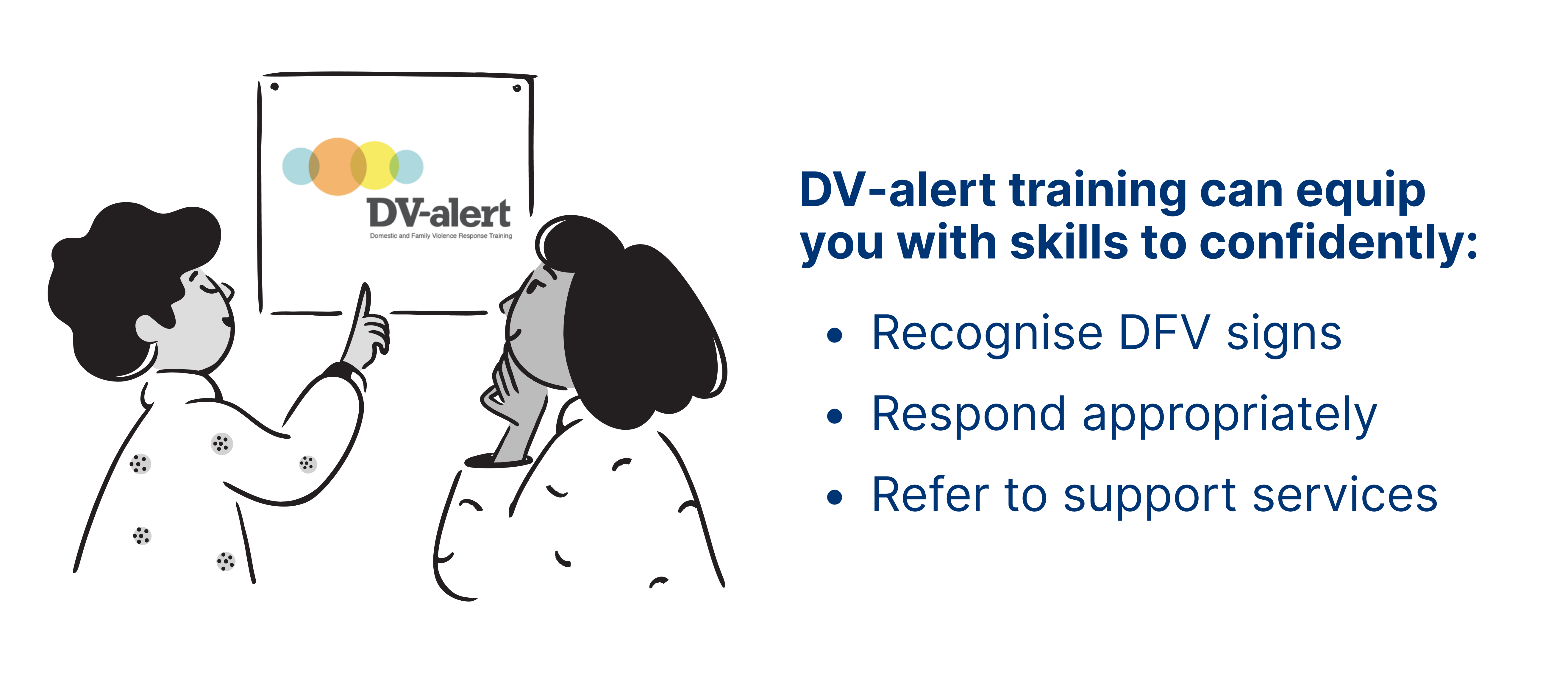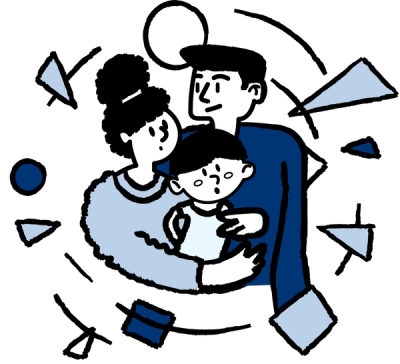Understanding DFV and how you can help
Domestic and family violence (DFV) can come in many different forms. Some of the most common types include emotional abuse like coercive control and stalking, physical abuse, and financial abuse.
DFV rarely just impacts the person being abused. Friends, family members, colleagues/classmates, and others close to the person can all be affected, which is why it makes sense if you’re feeling a range of emotions right now.
No matter what type(s) of abuse a person is experiencing, it can be distressing to know or hear that someone you care about is experiencing harm. It can also be upsetting if that person stays in or keeps going back to the abusive relationship when you know they aren’t safe and deserve better.
On this page, you’ll find information on:
- How to tell if someone might be experiencing DFV
- How to support someone experiencing DFV
- Tips for helping someone leave a DFV situation
- The importance of taking care of your own mental health.
Scroll down to learn more.
How to tell if someone is experiencing DFV
If you suspect someone you care about is experiencing DFV, you’ve likely noticed interactions that didn’t sit right or behaviour changes that seem out of character. Sometimes, it’s just a gut feeling that something is wrong.
Some common signs that someone is experiencing DFV include:
- Social isolation: Withdrawing or being kept from seeing family and friends
- Fear and agitation: Acting jumpy or worried about upsetting the other person
- Physical injuries: They have black eyes, bruises, scratch marks, broken bones, cuts or other injuries that they can’t or won’t explain
- Lack of independence: They won’t make decisions without consulting the abusive person
- Lack of privacy: The other person tracks their location, reads their messages or shows up to places uninvited
- Excuses for harmful behaviour: They defend, explain, try to cover up or blame themselves for the abuse
- Avoidance: They never want to talk about their relationship or personal life
- Harmful coping mechanisms: They’re increasing their use of alcohol and substances or showing signs of self-harm.
Recognising DFV usually involves observing patterns of behaviours over time. It may not be immediately obvious, but by understanding and noting the signs and effects, you can gradually piece together a clearer picture of what's happening.
You can contact 1800RESPECT (1800 737 732) for more information and advice on whether someone you care about is experiencing domestic and family violence.
How can I tell if someone is abusive?
People who are abusive and violent in relationships can be very good at hiding their behaviour and actions. They can actually be quite charming.
If the way the abusive person presents to you conflicts with how they may present in the relationship, it’s common to feel confused.
For example, they might:
- Put on a charming, warm, and loving facade around others
- Use threats and intimidation to keep the person they’re hurting from speaking up
- Emotionally manipulate the person they’re harming as well as their friends and family.
In some cases, the person experiencing DFV might not even realise that they’re experiencing abuse due to how extreme the emotional manipulation is.
How to support someone experiencing DFV
Whether the person you care about realises they’re experiencing DFV or not, your presence and support can play a huge role in their safety and wellbeing.
If you haven’t expressed your concerns or haven’t yet acknowledged details the other person may have shared with you, it can be helpful to initiate a one-on-one conversation.
Scroll down for tips from SAFE + EQUAL on how to have that conversation.
Ask them if they're safe
When talking to someone about concerns for their safety, it's important that the person you care about feels comfortable to open up.
If possible:
- Ask where they would be comfortable having a conversation
- Avoid asking over text or email, as this may not be safe
- Have the conversation in person
- Walking or sitting side by side can make talking easier
- Be patient and listen without judgement
- Don’t force them to talk if they’re not ready.
When you're ready to ask how they are, remind them how much you care before asking about their safety. For example, you could ask:
“I've been thinking about you a lot lately. Do things feel safe at home?”
- You could also ask things like:
- 'I'm really worried about you and need to ask: Do you feel unsafe in your relationship?'
- 'You don't seem like your normal self. Is there anything or anyone making you feel upset or unsafe at the moment?’
- 'You know I'm here for you no matter what. Is your relationship feeling unsafe?'
Listen without judgement
Once you've asked about safety, listen without judgement, don't interrupt, and avoid jumping straight to solutions.
It can be scary to talk about experiencing any type of abuse. Don't be discouraged if the person you care about says they're 'fine' or shuts you down. Simply asking and letting them know you care can have a big impact.
Below, we've provided a few ideas on how to respond if they say things like 'I'm fine', 'I don't want to talk about it', 'I'm not safe' and 'I'm scared'.
- What to say if they respond with 'I'm fine' or 'I don’t want to talk about it'
If it feels right, you can respond with:
- 'You can always talk to me if anything changes.'
- 'That's okay, I'm here if you change your mind.'
- 'Is there anything I can do to support you?'
- 'You can talk to me anytime.'
And remember, you can ask again later if you’re still worried.
- What to say if they respond with 'No, I’m not safe' or 'I’m scared'
It takes a lot of strength for someone to tell you they don't feel safe or are scared for their safety.
While remaining calm, you can thank them for trusting you and say things like:
- 'Are you in danger right now?'
- 'Do you feel comfortable talking about it?'
- 'I believe you. Thank you for trusting me.'
- 'That behaviour is not okay.'
- 'You don't deserve to be treated that way.'
- 'Let’s find some information and look at your options.'
Believe them
When someone experiences DFV, it can leave them doubting their judgement and memory.
One of the most effective ways you can empower the person you care about is to believe them, validate their feelings, trust their experiences, and connect them with support.

You can also offer a safe space for them to ‘sense-check’ their experiences. If things like coercive control or gaslighting have occurred, they might be feeling confused about their own experiences and reality.
Simply offering them a non-judgemental space to play back the events opens up an opportunity for them to be heard and validated. This can help them gain clarity and empower them to trust their instincts.
Offer empathy, not sympathy
An important way we feel safe and connected is by feeling heard. It can be difficult to hold back from saying things like ‘You’re so much better than this!’ or ‘Why don’t you just leave?’
However, the person you care about needs to have their emotions and experience validated.
For example, you could say:
“That’s a lot to go through. I understand why you’re feeling this way.”
If they move into blaming themselves for the abusive behaviour, reassure them it's not their fault. To learn more about how to show empathy, you can watch the video below.
Encourage them to seek help
It’s understandable if you want to try and convince the person you care about to reach out for help.
However, sometimes, this can have the opposite effect. Instead, gently suggest options and let them know you respect their decision either way. Ultimately, the choice is theirs.
You can suggest going to the police or contacting free and confidential counselling services like 1800RESPECT (1800 737 732) and Full Stop (1800 385 578). They can also always contact Lifeline.
For a full list of the domestic and family violence support services available, visit our DFV support services page.
Respect their decisions
Leaving an abusive situation can be scary, complex, and may not happen immediately. For a number of reasons, the person you care about may not feel ready to leave and that’s okay.
It’s important to respect their right to make their own decisions. Remind them that you’re there to listen and help whenever they’re ready for practical and emotional support.
Regardless of the outcome, keep communication open by checking in regularly and reminding them they have your support. This constant reminder that you’re there for them will be important when they do feel ready to leave.
Practical ways you can offer support
When people experience abuse, they can end up with low self-esteem and/or experience mental health conditions like anxiety, depression, post-traumatic stress disorder (PTSD), and suicidality.
Experiencing these challenges can make it difficult to prioritise and practise basic self-care like eating well, sleeping enough, exercising daily, and connecting with other people.
- You can provide practical support by:
- Assisting with daily tasks: You can help lighten their load by offering to watch kids, pick up groceries, or run errands
- Connecting them with resources: Researching legal aid options, support services, and other information can help empower your loved one to make informed decisions about their future
- Staying connected: Regularly checking in shows your ongoing support and concern. A simple text message, a call, or a visit can provide much-needed emotional reassurance that they are cared for.
Escaping and healing from domestic and family violence takes time and requires a lot of patience from friends and family.
There may be ups and downs along the way, but your consistent presence and support throughout their journey can help break the cycle of abuse and make a lasting difference in their life.
Helping someone leave a DFV situation
If the person you care about has accepted your help or confided in you about their decision to leave an abusive relationship, there are practical steps you can take to support them.
- You can offer support by helping them:
- Create a safety plan: Because the risk of violence is greater in the lead-up to separation and just afterwards, having a safety plan in place can offer additional protection
- Pack an escape bag: An escape bag is especially important if the person you care about needs to leave quickly. Click here to learn what to include.
- Connect with DFV support services: Whether the person you care about is considering leaving, needs help to leave or is seeking support after leaving, they may need help with legal matters, accessing financial support, and finding employment. These organisations can help.
- Get emotional support: It takes a lot of strength and courage to leave an abusive relationship. Being consistent in your approach and offering ongoing support is important in helping the person you care about heal and move forward. If it feels right, you can help them book an appointment with a GP to talk about getting a Mental Health Treatment Plan.
Learn more about helping someone leave a domestic and family violence situation at 1800RESPECT.
For information on how to help someone experiencing tech-based abuse, visit the eSafety website or our short-term help for DFV page.
The importance of taking care of your own mental health
Supporting someone through domestic and family violence can be extremely tough mentally and emotionally.
It’s painful to know someone you care about is being abused and harmed, and it’s natural to feel sad, angry, frustrated, and helpless.
- It's common to feel:
- Confused about what is and isn’t ‘abuse’
- Afraid for their safety (as well as the safety of yourself and other family members)
- Uncertain about what to do and how to help
- Guilty that you’re not doing enough
- Hopeful that things can change
- Frustrated that the person you care about isn’t leaving the relationship.
While all of these emotions are valid, it's important to acknowledge them and prioritise your own self-care. If you don't, it can be even harder to offer support to the person you care about.
Here are a few ways you can prioritise your self-care:
- Establish boundaries on how much you can emotionally handle
- Be clear about what you can and cannot do to help
- Reach out to friends, family, or a psychologist to talk about your feelings and gain some outside perspective
- Practise stress-relief activities like meditation, mindfulness, grounding techniques, or journaling
- Eat well, exercise regularly, and get enough sleep
- Ensure you schedule breaks and downtime for yourself.
Remember, taking care of yourself is not selfish. It’s a necessary part of being able to care for others.
By prioritising your own needs, you’ll protect your mental health and be better equipped to support the person you care about through whatever they're going through.
Are you looking for information on DFV training for yourself or your organisation?
Delivered by Lifeline, DV-alert offers online and in-person domestic and family violence response training for:
- Paid and volunteer frontline workers in health, allied health, education, and community sectors
- Anyone wanting to understand DFV and learn how to support someone they care about.
Click here to visit the DV-alert website.







